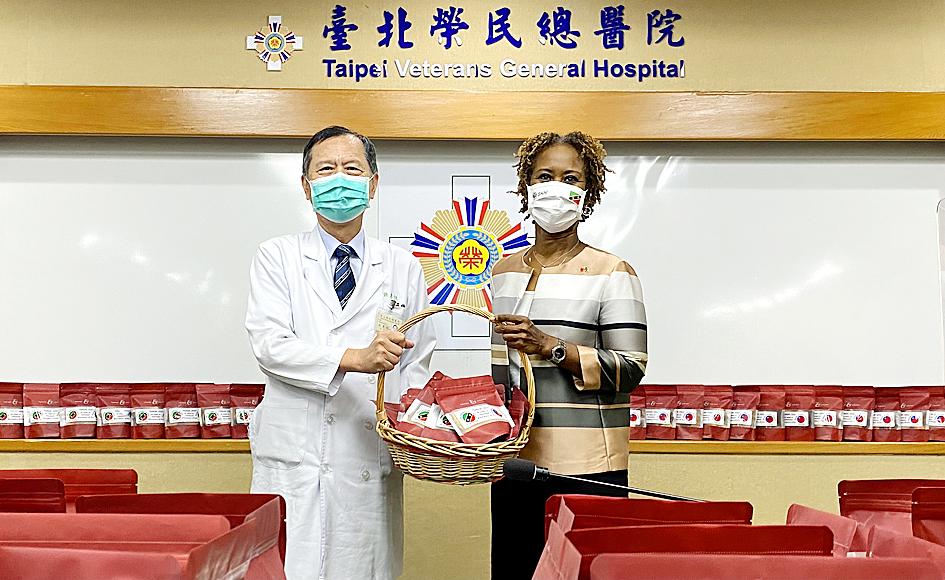Saint Kitts and Nevis Ambassador to Taiwan Jasmine Huggins yesterday sent 138 bags of handmade snacks to Taipei Veterans General Hospital personnel, thanking them for assisting the Caribbean nation in guarding public health and to mark 38 years of diplomatic relations with Taiwan.
The connection between the hospital and Saint Kitts and Nevis, one of Taiwan’s 15 diplomatic allies, stems from a collaborative project on the treatment of chronic kidney diseases, which was supported by the International Cooperation and Development Fund.
Hospital superintendent Wayne Sheu (許惠恒) said that the two sides are seeking to deepen their cooperation through a follow-up project on the prevention and control of metabolic disorders, such as hypertension, obesity and diabetes.

Photo: CNA
Due to the COVID-19 pandemic, the hospital designed online courses for Saint Kitts and Nevis medical personnel, he added.
“It is better to give than to receive,” Huggins said, as she presented the snacks and masks featuring the country’s national emblem to management personnel at the hospital in Taipei’s Tianmu (天母) area.
Calling the workers “unsung heroes and heroines at the hospital,” Huggins said that she hoped the gifts would bring a smile to their faces.
Taiwan was the first country to establish diplomatic relations with Saint Kitts and Nevis after it became independent on Sept. 19, 1983, she said.
“Educational opportunities in Taiwan continue to beckon our young people, many of whom have returned to the Federation [of Saint Kitts and Nevis] with advanced training and skill sets,” she said.
Two Saint Kitts and Nevis nationals, Jamella Fraser and Davina Cranstoun, helped make the snacks at an ABV Bar & Kitchen branch.
To mark Saint Kitts and Nevis’ national day, which was on Sunday last week, its embassy is hosting a series of activities, including at Tianmu Baseball Stadium in Taipei today where the ambassador is to throw the first pitch at a Wei Chuan Dragons baseball game.

A small number of Taiwanese this year lost their citizenship rights after traveling in China and obtaining a one-time Chinese passport to cross the border into Russia, a source said today. The people signed up through Chinese travel agencies for tours of neighboring Russia with companies claiming they could obtain Russian visas and fast-track border clearance, the source said on condition of anonymity. The travelers were actually issued one-time-use Chinese passports, they said. Taiwanese are prohibited from holding a Chinese passport or household registration. If found to have a Chinese ID, they may lose their resident status under Article 9-1

Taiwanese were praised for their composure after a video filmed by Taiwanese tourists capturing the moment a magnitude 7.5 earthquake struck Japan’s Aomori Prefecture went viral on social media. The video shows a hotel room shaking violently amid Monday’s quake, with objects falling to the ground. Two Taiwanese began filming with their mobile phones, while two others held the sides of a TV to prevent it from falling. When the shaking stopped, the pair calmly took down the TV and laid it flat on a tatami mat, the video shows. The video also captured the group talking about the safety of their companions bathing

PROBLEMATIC APP: Citing more than 1,000 fraud cases, the government is taking the app down for a year, but opposition voices are calling it censorship Chinese Nationalist Party (KMT) Chairwoman Cheng Li-wun (鄭麗文) yesterday decried a government plan to suspend access to Chinese social media platform Xiaohongshu (小紅書) for one year as censorship, while the Presidential Office backed the plan. The Ministry of the Interior on Thursday cited security risks and accusations that the Instagram-like app, known as Rednote in English, had figured in more than 1,700 fraud cases since last year. The company, which has about 3 million users in Taiwan, has not yet responded to requests for comment. “Many people online are already asking ‘How to climb over the firewall to access Xiaohongshu,’” Cheng posted on

A classified Pentagon-produced, multiyear assessment — the Overmatch brief — highlighted unreported Chinese capabilities to destroy US military assets and identified US supply chain choke points, painting a disturbing picture of waning US military might, a New York Times editorial published on Monday said. US Secretary of Defense Pete Hegseth’s comments in November last year that “we lose every time” in Pentagon-conducted war games pitting the US against China further highlighted the uncertainty about the US’ capability to intervene in the event of a Chinese invasion of Taiwan. “It shows the Pentagon’s overreliance on expensive, vulnerable weapons as adversaries field cheap, technologically